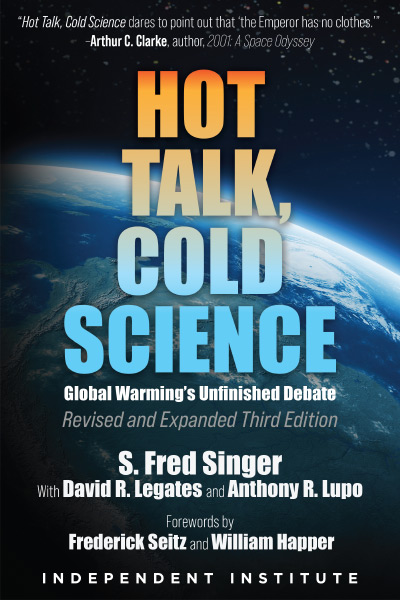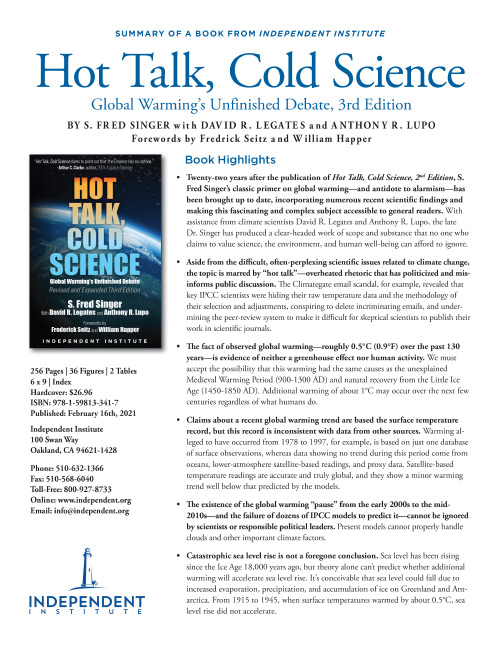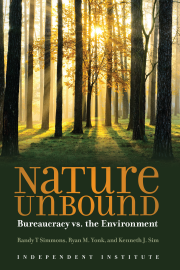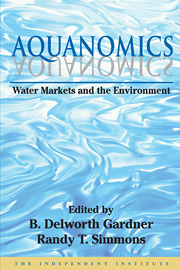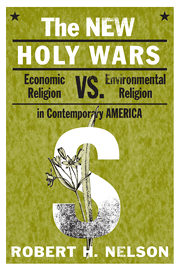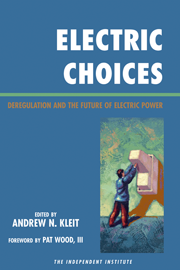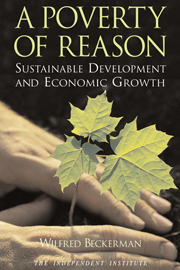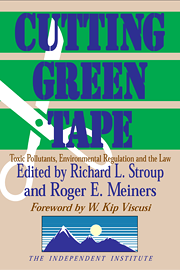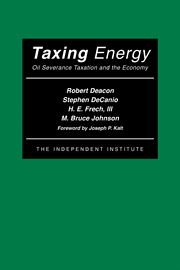| List Price: | ||
| Price: | $22.91 | |
| Discount: | $4.04 (Save 15%) |
| List Price: | ||
| Price: | $22.91 | |
| Discount: | $4.04 (Save 15%) |
Overview
The revised and expanded third edition of Hot Talk, Cold Science forms the capstone of the distinguished astrophysicist Dr. S. Fred Singer’s lucid, yet hard, scientific look at climate change. And the book is no less explosive than its predecessors, and certainly never more timely.
Singer explores the inaccuracies in historical climate data, the limitations on and failures of climate models, solar variability along with the effects of clouds, ocean currents, and sea levels on global climate, plus factors that could mitigate any human impact on world climate.
Singer’s masterful analysis decisively shows that the pessimistic, and often alarming, global warming scenarios depicted in the media have no scientific basis. In fact, he finds that many aspects of increased CO2 levels as well as any modest warming, such as a longer growing season for food and a reduced need to use fossil fuels for heating, would have a highly positive impact on the human race. Further, Singer notes how many proposed “solutions” to the global warming “crisis” (like “carbon” taxes) would have severe consequences for economically disadvantaged groups and nations.
As alarmists clamor to impose draconian government restrictions on entire populations in order to combat “climate change,” this book reveals some startling, stubborn contradictory facts, including:
- CO2 has not caused temperatures or sea levels to rise beyond historical rates.
- Severe storms have not increased in frequency or intensity since 1970—neither have heat waves nor droughts.
- Global change is not harming coral reefs.
- Any increases in CO2 concentrations across huge time spans (there have been a few) haven’t preceded rising global temperatures; they’ve followed them by about six to eight hundred years—just the opposite of alarmist claims.
- Alarmist climate scientists have hidden their raw temperature data and deleted emails—then undermined the peer-review system to squelch debate.
In sum, despite all the hot talk—and outright duplicity—there is no “climate crisis” resulting from human activities and no such threat on the horizon.
With the assistance of renowned climate scientists David R. Legates and Anthony R. Lupo, Singer’s Hot Talk, Cold Science is an essential, clear-headed book of scope and substance that no one who claims to value science, the environment, and human well-being can afford to ignore.
Contents
Acknowledgments
Foreword to First and Second Editions by Frederick Seitz
Foreword to Third Edition by William Happer
Preface
List of Figures
List of Boxes
Part 1 / Hot Talk
- A Century of Climate Concerns
Little Support for the Greenhouse Theory • Warming or Cooling? • Fear of Global Warming - FCCC and the Kyoto Protocol
The Earth Summit • Framework Convention on Climate Change (FCCC) • The Kyoto Protocol - The Paris Agreement
Failure in Copenhagen • The Paris Agreement • A Big “Nothing Burger” • Leaving the FCCC - Misled by the IPCC
A Fake Consensus of Scientists • Corruption of the Peer-Review Process • The Missing Hotspot • Walking Back Key Alarmist Claims • A Huge Public Deception - The Hockey Stick Deception
The Hockey Stick Illusion • The Illusion Exposed - The Climategate Scandal
“An Organized Conspiracy” • The Scientific Background • International Journal of Climatology • In the Courtroom
Part 2 / Cold Science
- What Science Really Says
The Temperature Record • What We Think We Know • What We Know We Don’t Know • Severe Storms Are Not Increasing • Heat Waves Are Not Becoming More Common • Droughts Are Not Becoming More Common • Global Warming is Not Harming Coral Reefs - The Unreliable Surface Temperature Record
Two Warming Periods or One? • Corrupt Data and Changes in Instrumentation - The Gap Between Observed Temperatures and Climate Models
No Warming Trend • The Gap Between Observations and Models • Internal Causes • External Causes • Jet Contrails • Solar Influences • Other Possible Causes - Does CO2 Lead to Cooling?
The Theory • Assumptions • A Typical Reaction - Sea-Level Rise
Sea-Level Rise Is Not Accelerating • A Test of the Global Warming Theory • The Missing Water Is Turning into Ice - Malthusians versus Cornucopians
Rise of the Environmental Movement • “Sustainable Development” • Resource Depletion • Environmental Protection • Implications for Climate Change - Benefits of Modest Warming
How Much Warming Can We Expect? • Lessons from History • A Boon for Agriculture • “Greening of the Earth” • Positive Effects on Human Health - Mitigation, Sequestration, or Adaptation
Mitigation: Reducing Emissions • Sequestration: Storing CO2 • Adaptation: Turning Tragedy into Opportunity - Unfinished Business
Unsettled Scientific Issues • The Truth Needs to be Told • Preparing for Global Cooling • Major Glaciations • Little Ice Ages • How to Overcome a Little Ice Age
Conclusion
Afterword by David R. Legates and Anthony R. Lupo
References
Acronyms
About the Authors
Index
Detailed Summary
- Twenty-two years after the publication of Hot Talk, Cold Science, 2nd Edition, S. Fred Singer’s classic primer on global warming—and antidote to alarmism—has been brought up to date, incorporating numerous recent scientific findings and making this fascinating and complex subject accessible to general readers. With assistance from climate scientists David R. Legates and Anthony R. Lupo, the late Dr. Singer has produced a clear-headed work of scope and substance that no one who claims to value science, the environment, and human well-being can afford to ignore.
- Aside from the difficult, often-perplexing scientific issues related to climate change, the topic is marred by “hot talk”—overheated rhetoric that has politicized and misinforms public discussion. The Climategate email scandal, for example, revealed that key IPCC scientists were hiding their raw temperature data and the methodology of their selection and adjustments, conspiring to delete incriminating emails, and undermining the peer-review system to make it difficult for skeptical scientists to publish their work in scientific journals.
- The fact of observed global warming—roughly 0.5°C (0.9°F) over the past 130 years—is evidence of neither a greenhouse effect nor human activity. We must accept the possibility that this warming had the same causes as the unexplained Medieval Warming Period (900-1300 AD) and natural recovery from the Little Ice Age (1450-1850 AD). Additional warming of about 1°C may occur over the next few centuries regardless of what humans do.
- Claims about a recent global warming trend are based the surface temperature record, but this record is inconsistent with data from other sources. Warming alleged to have occurred from 1978 to 1997, for example, is based on just one database of surface observations, whereas data showing no trend during this period come from oceans, lower-atmosphere satellite-based readings, and proxy data. Satellite-based temperature readings are accurate and truly global, and they show a minor warming trend well below that predicted by the models.
- The existence of the global warming “pause” from the early 2000s to the mid-2010s—and the failure of dozens of IPCC models to predict it—cannot be ignored by scientists or responsible political leaders. Present models cannot properly handle clouds and other important climate factors.
- Catastrophic sea level rise is not a foregone conclusion. Sea level has been rising since the Ice Age 18,000 years ago, but theory alone can’t predict whether additional warming will accelerate sea level rise. It’s conceivable that sea level could fall due to increased evaporation, precipitation, and accumulation of ice on Greenland and Antarctica. From 1915 to 1945, when surface temperatures warmed by about 0.5°C, sea level rise did not accelerate.
Is climate change harming Earth’s biosphere and human well-being? How should policymakers respond to the possibility that greenhouse gases emitted by human activity, chiefly from the burning of fossil fuels, can lead to global warming? Is there a single book on climate science and policy that serves as both an accessible starting point for lay readers and a concise summary of new studies useful to those already versed in these complex and vital issues?
In 1997 atmospheric physicist S. Fred Singer—the founding director of the U.S. Weather Satellite Center—wrote the first edition of Hot Talk, Cold Science: Global Warming’s Unfinished Debate. A second edition came two years later, and the book is now deemed a classic. Dr. Singer passed away in 2020, but not before expanding and updating his much-discussed book with assistance from climatologist David R. Legates (University of Delaware) and atmospheric scientist Anthony R. Lupo (University of Missouri).
Incorporating recent developments in science, economics, and public policy, Hot Talk, Cold Science, 3rd Edition is a badly needed de-coding device to a sprawling, highly technical literature, giving readers a clear understanding of what scientists and policymakers know about climate change—and what they don’t. By separating rhetoric from reality, this well-timed release allows readers to better detect and think beyond the hyperbole and propaganda all-too-common in media coverage of this heated subject.
The stakes in this global debate, Dr. Singer reminds us, are monumental. With some calling for restrictions or carbon taxes to reduce the use of fossil fuels and get climate change under control, and others warning that impeding access to affordable energy would consign large segments of the world’s population to deeper, more prolonged poverty, the only ground shared by all sides may be a burning sense of urgency for more research and education. By bringing vital but often neglected findings to the forefront of the reading public, Hot Talk, Cold Science: Global Warming’s Unfinished Debate, 3rd Edition can play a critical part in stimulating fresh discussion on the most important scientific and policy issue of our times.
Hot Talk
Like the entire temperature record, the timeline of rhetoric about climate worries is marked by periods of advancement and retreat. By the mid 20th century, scientists had known for decades that atmospheric concentrations of carbon dioxide (CO2) were rising due to the burning of fossil fuels—oil, gas, and especially coal. Most thought it wasn’t cause for concern: water vapor, they believed, was already absorbing any long-wave radiation that might otherwise cause additional CO2 to exert a greenhouse effect. Moreover, air temperatures had been declining since about 1940, prompting some to worry that air pollution and human activity could hasten the onset of another ice age.
Fear of global warming didn’t gain momentum until the 1980s. In 1979, the National Academy of Sciences speculated that water vapor feedback would cause a doubling of atmospheric CO2 to increase temperatures by 1.5° to 4.5° Celsius. More alarming, temperatures rose rapidly from 1975 to 1980. At a time when Western nations were showing progress on water and air pollution, environmentalists increasingly took up the cause of global warming.
In 1988, as heat waves and droughts swept North America, hot talk reached a new peak. U.S. Senate hearings drew massive attention when NASA scientist James Hansen testified that he was “99 percent” sure that global warming had arrived. Unconvinced, Dr. Singer published that summer an op-ed in the Wall Street Journal arguing that “observed trends do not agree with expectation from greenhouse theory” and laying out scientists’ uncertainties about climate change. (The essay is one of seven short pieces reprinted in the book and recalling Dr. Singer’s key role throughout the climate debates.)
The year 1988 also saw the founding of the United Nations’ Intergovernmental Panel on Climate Change (IPCC), a scientific body whose reports have greatly shaped—and been shaped by—the views of policymakers. What followed was a series of meetings, in Rio de Janeiro, Berlin, Geneva, Kyoto, Madrid, and Paris, convened to lay the groundwork for a treaty restricting and reducing greenhouse gas emissions. The IPCC has been a key driver for a global treaty and a source of misinformation and alarmist rhetoric—on catastrophic droughts, floods, storms, rapid sea-level rise, a collapse of agriculture, and a spread of tropical disease—messaging adopted and amplified by environmental groups and media around the world. The organization has also repeatedly hid scientific uncertainty, the absence of critical data, and evidence that questions or contradicts its apocalyptic prediction.
The IPCC has walked back some of its earlier alarmist claims, but it hasn’t been the only scientific authority to pass off misinformation. In the late 1990s, geoscientist Michael Mann got media attention by publishing his “hockey stick” graph, purporting to show nearly one thousand years of flat temperatures in the Northern Hemisphere, until spiking around the turn of the 20th century with the surge of industrial civilization. Later analysis found Mann’s inferences and methods lacking, and his graph was dropped from subsequent IPCC reports. A different episode—dubbed Climategate—uncovered emails from the Climate Research Unit suggesting unethical attempts to hide raw data and to prevent climate “skeptics” from getting published in top scientific journals. The media coverage may have played a decisive role in cooling the public’s enthusiasm for a global climate treaty.
Cold Science
Scientists of all stripes overwhelmingly agree on several key issues related to climate. They agree, for example, that human activity has increased levels of greenhouse gases in the atmosphere; and that the leading greenhouse gas is water vapor (which along with atmospheric CO2 has kept the oceans from freezing over). Moreover, what scientists know about global trends in climate events and other phenomena often run counter to popular belief: Severe storms have not increased in frequency or intensity since 1970 (except in the eastern North Pacific); heat waves and droughts are not becoming more common; global warming is not harming coral reefs; and sea levels are not rising any faster than usual.
Unfortunately, what we think we know about climate change is dwarfed by what we don’t know, and the gaps in our knowledge lead to disagreements. Scientists disagree, for instance, about why rising levels of greenhouse gases have not caused the degree of global warming predicted by current climate models; they disagree over whether changes in global temperature or other climate elements are due to increased concentrations of greenhouse gases (especially CO2) in the atmosphere; and they disagree about what constitutes the “right” or “best” atmospheric levels of CO2 and global temperatures for humans or for the natural world. The list goes on.
Temperature data—past and present—are fundamental in the climate change debate. The only reliable global temperature record, however, comes from satellite-based readings of lower-atmosphere temperatures taken since 1979. When that record is used to test the accuracy of models that purport to show the impact of human activity on Earth’s climate, the models invariably fail, revealing that human-caused CO2 emissions have little or even no influence on global temperatures.
The gap between temperature observations and model estimates raises a key question: Why does CO2 appear to no longer affect the climate? Dr. Singer offers informed speculation (but notes that his hypothesis is counterintuitive and has yet to be tested).
What about sea level rise? Here is another area where specialists depart from common belief. The rate of sea level rise isn’t accelerating. Local coastal sea level rise, however, is highly variable worldwide, depending on differing rates at which coasts undergo tectonic uplift or subsidence of the shoreline, as groundwater and minerals are extracted. Dr. Singer forecasts sea level rise in the range of 18 to 20 centimeters by 2100. Presumably due to improved evidence and methods, the IPCC has reduced its maximum forecasts to 59 centimeters (IPCC 2007), down from 367 centimeters (IPCC 1990).
The climate change debate can be understood as just one more clash between economic and technological pessimists (“Malthusians”) and optimists (“Cornucopians”). These opposing groups have clashed over economic development, resource depletion, and environmental progress. A full assessment must take stock of the benefits of modest warming, such as its boon for plant and animal life in nearly all parts of the globe and positive effects on human health. The conflict of visions also surfaces in regard to which response to global warming is given priority: mitigation, CO2 sequestration, or human adaptation. Dr. Singer argues that adaptation has more associated benefits.
In their afterword to Hot Talk, Cold Science, 3rd Edition, climatologists David R. Legates and Anthony R. Lupo state that no one was more qualified to write a book incorporating recent developments in the science and politics of climate change than Dr. Singer. “His myriad of accomplishments serves to illustrate why he is one of the very few people who have both the requisite political experience and the scientific background,” Drs. Legates and Lupo write. “Over the years and despite all the invectives poured upon him by the alarmists, Dr. Singer has stood his ground for scientific integrity and adherence to the scientific method. For that, he is to be greatly commended.”
Praise
Praise for Third Edition of Hot Talk, Cold Science
“In Hot Talk, Cold Science, Fred Singer looks at the issue of climate change the way a physicist should. He asks probing questions and offers reasoned possibilities. He notes the obvious weaknesses that others too often ignore and freely acknowledges his own limitations. The biggest weakness is the obvious refusal of those promoting alarm to allow the questioning that is the heart of science. Nothing better illustrates the fact that we are dealing with a political cum religious cult rather than science where the quest for power overwhelms scientific inquiry. Alas, even scientists are often attracted by power and public recognition. Fortunately, some like Dr. Singer still prefer the joys and value of scientific inquiry.”
—Richard S. Lindzen, Alfred P. Sloan Professor Emeritus of Meteorology; Department of Earth, Atmospheric and Planetary Sciences; M.I.T.
“As contentious as the climate issue was and is, I was always impressed by Fred Singer’s gentle demeanor within that storm. I suppose he remained calm because he sought to ground his views in the actual evidence of climate observations. In his day, reproducible evidence was the foundation on which one was taught to test one’s claims and he simply went about the business of checking out the latest theorized conjectures about the climate. Here in Hot Talk, Cold Science, he updates his findings regarding those conjectures, as well as giving a tour of the political landscape that melded itself to the climate-alarm agenda. His conclusions should give us all a modest sense of gentle calmness—that same calmness he carried to the end of his days.”
—John R. Christy, Distinguished Professor of Atmospheric Science; Interim Dean, College of Science; Director, Earth System Science Center, Johnson Research Center, University of Alabama in Huntsville; Alabama State Climatologist
“When debating environmental policy, we frequently hear from scientists, climate activists, and public officials who claim ‘the science is settled’ with regard to global warming. This book is a great reminder that the data are mixed at best. We should follow the science. Hot Talk, Cold Science provides the reader with important facts and evidence consistently and conveniently overlooked by climate alarmists, making clear the case on global warming is far from closed.”
—Ted Cruz, U. S. Senator; Chairman, Senate Subcommittee on Science and Space; Chairman, Senate Subcommittee on the Constitution, Civil Rights and Human Rights
“Hot Talk, Cold Science by the late Dr. Fred Singer with Dr. David Legates and Dr. Anthony R. Lupo is an enormously important contribution to the ‘unfinished debate on global warming’ and written by three highly authoritative and trustworthy climate scientists. I very enthusiastically recommend the book to everyone who wishes to learn why this debate is anything but ‘settled.’”
—Larry S. Bell, Endowed Professor, Sasakawa International Center for Space Architecture, University of Houston; author, Climate and Corruption: Politics and Power Behind the Global Warming Hoax and Scared Witless: Prophets and Profits of Climate Doom
“The third and substantially expanded edition of the book, Hot Talk, Cold Scienceby Fred Singer (with David Legates and Anthony Lupo), is one of the most important contributions undermining the economically and politically problematic and highly controversial scientific doctrine of man-made global warming. No one has done so much as Professor Singer in this respect. We all are his followers as he has shown how science has been compromised and misused for decades to justify politically and ideologically motivated, disastrous economic policies. The contradiction between Hot Talkand Cold Science is even more pronounced now than when this marvelous book was first published.”
—Václav Klaus, former President, Czech Republic; 1st Prime Minister, Czech Republic
“Anyone having an opinion or interest in climate change simply has to read the updated third edition of the book, Hot Talk, Cold Science. It is a fascinating and remarkable voyage over all the central aspects. No one can read it without learning a lot. It turns and twists the various arguments in a most constructive way. A well of knowledge!”
—Nils-Axel Mörner, Emeritus Professor of Paleogeophysics and Geodynamics, Stockholm University, Sweden
“Hot Talk, Cold Science is an excellent book on the politics and science of climate change. I particularly enjoyed the first part, ‘Hot Talk,’ that shows the duplicity of the climate alarmist community in exaggerating claims of imminent disaster (that has been 10 years away for decades) as well as suppressing contrary opinions from highly respected scientists (‘cancel culture’). I did not realize the true extent of these propaganda efforts until I read this book, which documents very well many of the shenanigans. The general public should know how far the alarmist ‘climate scientists’ (including Al Gore) strayed from good science in trying to bamboozle them. I have also found the second part ‘Cold Science’ enlightening, particularly the sections discussing how poorly the IPCC climate models have ‘predicted’ climate measurements. An analogous situation is the recent case of almost total failure of the epidemiological models to predict the COVID-19 pandemic’s progression and resulting deaths. In the case of the epidemiological models the general public can see almost in real time how poorly predictive they are. In both cases, one is trying to solve a non-linear, chaotic system to predict its future. It is well known in mathematics and physics that one does very poorly in predicting the detailed future time dependence of such a system. Yet the climate modelers persist in their folly, basing their models on a linear cause and effect of increasing anthropogenic CO2 driving the Earth’s climate.”
—Elliott D. Bloom, Professor Emeritus, Kavli Institute for Particle Astrophysics and Cosmology, Stanford Linear Accelerator Laboratory (SLAC); Fellow, American Physical Society; Member of the SLAC team with Jerome I. Friedman, Henry W. Kendall and Richard E. Taylor who received the 1990 Nobel Prize in Physics
“Science thrives on civil and dispassionate debate. It demands the use of our reason; in fact, it is useless without it. Dr. Singer, Dr. Legates and Dr. Lupo bring science and reason to a debate that has increasingly been driven by panic and politics. Twenty years have passed since the Second Edition of Hot Talk, Cold Science, and while its science has withstood the test of time, the rhetoric surrounding climate change has only grown more alarmist. Now more than ever, the public deserves Hot Talk, Cold Science’s thorough scientific and economic analysis of the realities of our environment.”
—Thomas M. McClintock, U.S. Congressman; Member, House Natural Resources Committee and House Judiciary Committee
“Singer, Legates, and Lupo’s book Hot Talk, Cold Science is excellent. I remain very concerned that the bulk of the environmental movement continues to ignore so many solvable issues while engendering global hyper-anxiety, particularly in the young generation, over a climate crisis that does not exist. This book presents an understandable and balanced review of the science that will leave readers with two conclusions; that our use of fossil fuels is remarkably benign to the environment and essential to the struggling global underclass, and that we have been greatly misled by those entrusted for sound environmental policy.”
—Ian D. Clark, Professor of Earth and Environmental Sciences, University of Ottawa, Canada
“Buy it, read it, and treasure it. . . . state-of-the-art. . . . every argument is made with the grace that is so lacking amongst global warming’s acolytes. . . . You’re going to like this greatly expanded edition of Hot Talk, Cold Science.”
—RealClear Energy
“The unsurprising political opposition to climate policy—substantial increases in energy costs combined with trivial future climate impacts—has led its proponents to make ‘crisis’ assertions as loud as they are unsupported by the evidence. That is why we will never observe in the crisis literature a discussion of ‘What We Know We Don’t Know.’ But the book Hot Talk, Cold Science offers that, and more broadly, a serious, objective, and highly informative discussion of actual climate science, evidence, and attendant implications. I recommend this book strongly to anyone in pursuit of an honest discussion of climate phenomena.”
—Benjamin Zycher, Resident Scholar, American Enterprise Institute
“The great S. Fred Singer lives on. Hot Talk Cold Science is the best exposition of Fred, with help from David Legates and Anthony Lupo, to engage everyone who still cares to listen, on the twists and turns of climate science. Knowing how selfless Fred has been for the past 25 years, I think this is Fred’s quiet way to pay final tribute to those very many of us who believe that science must come first before playing a secondary role to public bullying and political blackmailing. This is the reason why this book is so special and should be on everyone’s bookshelf.”
—Wei-Hock (“Willie”) Soon, astrophysicist and geoscientist, Solar and Stellar Physics Division, Harvard-Smithsonian Center for Astrophysics
“Twenty years forward of the 2nd edition arrives the welcome 3rd edition of Hot Talk, Cold Science: Global Warming’s Unfinished Debate. Drs. Singer, Legates and Lupo uphold the vital method of scientific inquiry, which is the only way to improve the current, blurred description of the physical nature of the human impact on the terrestrial ecosystem. Nonetheless, the scientific questions about global warming are largely inseparable (properly so) from policy discussion. Singer, Legates and Lupo present extensively updated and expanded material on both aspects. Where heat explodes in the debate is exemplified by loud claims that quantitative description of the vastly complex terrestrial ecosystem is ‘settled science,’ a belief destructive to invaluable scientific inquiry. Should piratical, adrenaline-mongering continue to strangle rational thought that is antithetical to improved scientific results? Singer, Legates and Lupo reject ignorance in favor of cool, scientific clarity in the search for illumination in the ways of the terrestrial ecosystem in order to inform best policy. As Singer, Legates and Lupo do, let’s keep the debate scientifically sound and enlightening.”
—Sallie L. Baliunas, former Staff Astrophysicist, Harvard-Smithsonian Center for Astrophysics
“The new, third addition of Hot Talk, Cold Science is the capstone of Fred Singer’s remarkably lucid and straightforward synthesis of anthropogenerated climate change. It is current, comprehensive and clear—just like Fred—a brilliant and fitting coda to the career of a pioneer.”
—Patrick J. Michaels, Senior Fellow, Competitive Enterprise Institute; former Research Professor of Environmental Sciences, University of Virginia; former President, American Association of State Climatologists; former Virginia State Climatologist
“There is a battle going on. It is not about the environment. It is not about global warming. It is about power and wealth. In Hot Talk, Cold Science, Singer, Legates and Lupo have provided the intellectual ammunition needed to defeat the well-financed fanatical forces with their frightening false narrative. This does not mean honesty will prevail but it means that with the research and arguments available to us by these two disciplined thinkers, the truth will prevail.”
—Dana T. Rohrabacher, former U.S. Congressman; former Chairman, Space and Aeronautics Subcommittee; Member, Committee on Foreign Affairs and Committee on Science, Space and Technology, U.S. House of Representatives
“Fred Singer, a battle-seasoned warrior of the climate science debates, died last year at the age of 95. The third edition of his highly readable and scientifically sound book, Hot Talk, Cold Science, has just been published, by the Independent Institute. David R. Legates and Anthony R. Lupo are coauthors who also wrote an afterword. . . . Singer’s book gives you all—a chronological account of the political debate; a serious discussion (with charts and graphs) of the science; and a plain-spoken analysis of both. . . . The surprising thing about Hot Talk, Cold Science is that it is easy to read and never boring, even though Singer included very detailed charts and graphs whose details are of greatest interest to the scientifically trained. It is easy to get the gist of them and to keep reading. Furthermore, almost anyplace that you dip into the book brings up something intriguing. . . . Singer’s book ends with a twist, typical of this analytical, observant, and creative mind: Perhaps we should be more worried about future cooling than warming—possibly a Little Ice Age like the one the world experienced, with great hardship, from 1400 to 1850. And Singer offers some ways of dealing with it if it happens. Overall, an excellent farewell from a key figure in the climate change debates.”
—Liberty and Ecology Blog
“As a trained statistician, I have long been puzzled by apocalyptic visions of CO2-driven ‘global warming’, when the data clearly show there has been but modest warming in recent decades. This is why I greatly welcome the new edition of Dr. Singer’s excellent Hot Talk, Cold Science: Global Warming’s Unfinished Debate, which confirms my suspicions that much of the ‘global warming’ agenda is bedevilled by fake news and driven by vested interests. Commitments to ‘decarbonize’ economies (not least of all in the U.K. and U.S.), at great economic cost, are therefore sadly misguided—especially when China, for example, has absolutely no intention of following suit.”
—Ruth J. Lea, C.B.E., Ph.D., Co-Founder, Global Vision; Economic Advisor, Arbuthnot Banking Group; former Chief Economist at Mitsubishi Bank; former Head, Policy Unit, Institute of Directors
“Climate alarmism is a hydra. No matter how often the politics of catastrophe, conformity and compliance are refuted by empirical data, new waves of hysteria emerge to sustain the self-fulfilling desire by acolytes to censure society needlessly and punitively. Fred Singer was an early and brave voice of reason and this edition of his classic book Hot Talk, Cold Science is a stark reminder of the contrast between politics and science in understanding the climate divide.”
—L. Graham Smith, Professor Emeritus of Geography, University of Western Ontario, Canada
“Fred Singer, like the little Dutch Boy who stood with his finger in the dike, fought against a flood of ill-advised policy decisions in the early years of the climate debate. Now he with climatologists David Legates and Anthony Lupo have armed us with the 3rd revised and expanded edition of Hot Talk, Cold Science. It is loaded with facts and technical details but it is written in a manner that is accessible to the non-expert. This new edition of Hot Talk, Cold Science is a timely contribution in a world where scientifically-illiterate policymakers are pushing immediate implementation of policies that could destroy the economies of developed nations and leave many developing nations in poverty, while unfairly benefiting certain nations, like China, that are willing to exploit the situation.”
—Peter D. Friedman, Professor of Mechanical Engineering, University of Massachusetts Dartmouth; Member, American Geophysical Union
“Where would we be without scientists who are skeptical about alarming predictions of doom accompanied by the ritualistic prescriptions of sacrifice offered up by self-appointed scientific elites and their enthusiastic collaborators in governments and the media? The answer is that we would be in a very dark place indeed. In this, the third edition, of Fred Singer’s book Hot Talk, Cold Science—this time with David Legates and Anthony Lupo—the authors again turn a skeptical eye to the nature of the evidence that is available on the Earth’s climate and how and why it changes, and on the effects of warming and of cooling. As with previous environmentalist alarms—think DDT, acid rain, and mercury in fish—the authors find that a properly skeptical assessment of the evidence does not support alarm. Nor does it support the crushingly expensive policies advocated by the alarmists and adopted by governments. For all our sakes, let us hope that people will read this book and help to turn the tide against the unscientific fear-mongering and bankrupting policies of the global-warming alarm movement sooner, rather than later.”
—Kesten C. Green, Senior Research Fellow, Ehrenberg-Bass Institute, University of South Australia; Co-Director, The Forecasting Principles; former Director, International Institute of Forecasters
“Without a doubt climate change continues to be the leading social and scientific topic of our times. In this updated and expanded edition of Hot Talk, Cold Science Fred Singer, David Legates and Anthony Lupo provide a very accessible, comprehensive and balanced overview of the state of climate science, as well as an important discussion of the propaganda and rhetoric used to influence the general public and politicians in the era of social media.”
—R. Timothy Patterson, Professor of Geology and Director, Paterson Laboratory, affiliated with the Carleton Climate and Environmental Research Group, Carleton Institute of Environmental Science, Global Water Institute, and Carleton Northern Studies Program; Carleton University, Canada
“If you are ever involved in climate-change debates, we expect that the argument goes much like this: First, you are told that the ‘science is settled,’ that 97% of scientists agree that a climate crisis is real, and that humans are the main cause. Second, the planet will suffer irreparable harm if something is not done immediately. In Hot Talk, Cold Science, Fred Singer (with David R. Legates and Anthony R. Lupo) bring some cold science to this hot debate. They provide a rational, comprehensive, and thoroughly documented discussion that will appeal to the general public as well as those in the scientific community.”
—Randy Simmons, Professor of Political Economy, Department of Economics and Finance, Utah State University; author, Nature Unbound: Bureaucracy vs. the Environment (with Ryan Yonk and Kenneth Sim)
“Listening to the IPCC on climate change is like blasting your ears with a fire alarm you can’t turn off. In contrast, Dr. Singer has been completely consistent over the years with his message that climate change is not a single variable problem, that water vapour and not carbon dioxide is far more important and that natural variables such as the oceans, the clouds and solar activity have been simply left out by mainstream climate science. Now with his superb book Hot Talk, Cold Science, it is way past time we listened to his message.”
—Curt G. Rose, Emeritus Professor of Environmental Studies and Geography, Bishop’s University, Canada
“Now in a thoroughly revised and significantly expanded third edition, Hot Talk, Cold Science: Global Warming’s Unfinished Debate continues to form the capstone of the distinguished astrophysicist Dr. S. Fred Singer’s lucid, timely, dramatic, yet hard-science look at climate change. Dr. Singer fully explores the inaccuracies in historical climate data and the failures of climate models, as well as the impact of solar variability, clouds, ocean currents, and sea levels on global climate—plus factors that could mitigate any human impact on world climate. Singer’s masterful analysis decisively shows that the pessimistic, and often alarming, global-warming scenarios depicted in the media have no scientific basis. In fact, he finds that many aspects of increased levels of CO2, as well as any modest warming, such as a longer growing seasons for food and a reduced need to use fossil fuels for heating, would have a highly positive impact on the human race. As alarmists clamor to impose draconian government restrictions on entire populations in order to combat ‘climate change, Hot Talk, Cold Science: Global Warming’s Unfinished Debate reveals some other startling, stubborn contradictory facts. In sum, despite all the hot talk (and some outright duplicity), Dr. Singer’s position is that there is no ‘climate crisis’ resulting from human activities and no such threat on the horizon. Iconoclastic, eloquent, erudite, and offering a minority opinion on the subject, Hot Talk, Cold Science: Global Warming’s Unfinished Debate offers a climate-change denial argument that should be a part of every community, college, and university library Environmental Issues collections in general, and supplemental Climate Change curriculum studies reading lists in particular.”
—Midwest Book Review
“In Hot Talk, Cold Science, eminent climatologists S. Fred Singer, David Legates and Anthony Lupo reveal many flaws that underlie modern global warming theory. Most importantly, perhaps, is their exploration of scientific modeling—necessary at times, but unreliable for important policy decisions. As they show, such models can be and have been manipulated to advance beliefs and opinions under the guise of science. This book makes an indispensable contribution to a crucial debate.”
—Ronald J. Rychlak, Distinguished Professor of Law and Jamie L. Whitten Chair of Law & Government, University of Mississippi School of Law
“Hot Talk, Cold Science is readable to the layperson and nicely lays out the arguments. It is a thorough collection of the main climate skeptical arguments—backed by science, not just hype. It answers the questions: ‘Why do some very smart people still not accept such arguments? How can they possibly still be deluded?’ Read this book.”
—Peter V. Bias, William F. Chatlos Professor of Business and Economics, Florida Southern College
“I have read many of Fred Singer’s scientific publications, including his NIPCC reports and essays—always courageous and unbiased. To read his book Hot Talk, Cold Science for the first time is an eye-opener to learn how Singer at an early stage discovered how a sound scientific debate became mixed with politics, and how this has created a distrust of science. May this important book lead us back to an open scientific debate without political pressure. The complex science of climate change has to be investigated from many angles and Fred Singer has shown us how.”
—Jan-Erik Solheim, Professor Emeritus, Institute of Theoretical Astrophysics, University of Oslo, Norway
“Hot Talk, Cold Science is surely the most complete and insightful book on the convoluted subject of climate change—both from a historical scientific perspective and a political game-like one. Fantastic indeed, as a reference, and also posing the right questions on this very complex and important subject.”
—Peter Stilb, Emeritus Professor of Chemistry, KTH, Royal Institute of Technology, Sweden
“The products of science constitute one of the most strikingly glorious examples of the reasoning mind in action, producing the advanced civilization that many enjoy today. But, through the push of so-called ‘climate change/global warming’ alarmists, science has been under attack by those who capitalize on its name while destroying its methods. The attack is global and has come through scientific organizations, national academies, interest groups, the media, and politicians. In order for ordinary citizens to understand the attack, they would immeasurably benefit by the clear explanations (supported by extensive references) in Hot Talk, Cold Science by S. Fred Singer, a scientist of high integrity and honesty who has made an extensive study of the alarmist claims over many years. I think that Hot Talk, Cold Science would greatly help people to understand (using a related quote from the book) the ‘terrible crime against science, the adoption of unnecessary and very costly policies, and grave damage to the reputation and credibility of science.’”
—Laurence I. Gould, Professor of Physics, University of Hartford; former Chair, New England Section of the American Physical Society
“We have all repeatedly heard about global warming and the alleged future disasters caused by our way of life, by media, politicians and scientists who paint a disastrous future due to man-made climate change. Unfortunately, this is a subject with significant political and economic interests that are well known to twist what is right and wrong. With the book, Hot Talk, Cold Science by Drs. S. Fred Singer, David R. Legates, and Anthony R. Lupo, we have the opportunity to receive a second opinion that usually cannot be heard on the science and politics. Read it, and you will be better-informed.”
—Henrik Svensmark, Professor, Division of Solar System Physics, Danish National Space Institute, Technical University of Denmark
“Hot Talk, Cold Science is very well-written and quite informative for the climate science community at large. The book also provides excellent examples of the flawed science of anthropogenic warming (AGW) and the meaningless push by the advocates of AGW and also by climate modelers to ‘Reduce CO2’, which will be enormously expensive and have minuscule impact on the Earth’s climate.”
—Madhav L. Khandekar, former Research Scientist, Environment Canada; Expert Reviewer, IPCC 2007 Climate Change Documents; Member, Editorial Board, Journal of Natural Hazards
“In Hot Talk, Cold Science, Fred Singer, David Legates and Anthony Lupo make a strong case that politics, not sound science, is in the driver’s seat of the fears of dangerous, manmade climate change. They provide overwhelming scientific evidence that climate change, though having always been real, is not overwhelmingly manmade and is not even one of the most serious problems facing mankind—let alone an existential threat. They also show precisely what political agendas lie behind the alarmist message—and what must be done to counter them before they undermine freedom and human well-being throughout the world, trapping billions in bondage and poverty. Hot Talk, Cold Science is brilliant, comprehensive, timely, and thoroughly vetted.”
—E. Calvin Beisner, Ph.D., Founder, Cornwall Alliance for the Stewardship of Creation
“It takes real science to get rockets into space and design the instruments that collect environmental data. Yet many of the people and agencies who have handled this data have altered them by ‘administrative adjustments,’ using methods that are not revealed, and then use the output in computer simulations designed to justify alarmist hypotheses about future weather and climate. This is definitely not the scientific method. Fred Singer has designed rockets and their instruments, and he has also wrestled with the challenges of data interpretation and misinterpretation. With his unique qualifications, his book Hot Talk, Cold Science tells the story of global warming, exposing the rotten core of pseudoscience, the corrupt politics and the dirty tricks. He has done it beautifully.”
—Clifford D. Ollier, Professor Emeritus of Geology and Research Fellow, School of Earth and Geographical Sciences, University of Western Australia
“In Hot Talk, Cold Science, Fred Singer has elegantly summarized the almost complete dichotomy between the actual science indications that greenhouse gases have a very modest effect on climate at best, and the alarmist view promoted by U.N. I.P.C.C. Science and embraced by most governments worldwide. Derived policies will result in huge expenditure, little discernible effect on climate and negative effects on the standard of living. Unfortunately, all governments financially support almost all science and education, meaning there has now been more than 25 years of sponsored indoctrinated education of our young people worldwide. It seems therefore unlikely that climate policy will change any time soon. The likelihood of any real-world progress towards U.N., I.P.C.C. or government aims for meaningful emissions reductions is indicated by the fact that the world’s emissions have increased by about 65% since 1990, a period of time during which most world country governments have professed to embrace policies to achieve exactly the opposite. Eventually sanity will prevail perhaps catalyzed by increasing unrest from various social, industry and political groups throughout the world bringing real policy change. We have already seen such unrest with the Mouvement des Gilets jaunes in France and agricultural industry protests in Europe as governments try to increase the cost of energy or force draconian reductions in animal agriculture. Hot Talk, Cold Science is a complete, concise, factual and very valuable addition to the climate debate. I commend it to all, and suggest it should be compulsory reading for all elected government, regional and local government officials and policymakers.”
—Arthur John Allison, ONZM, Fellow, New Zealand Institute of Primary Industry Management; former Director of Agricultural Research for the Southern South Island, Ministry of Agriculture and Forestry, New Zealand; former Manager Director, Silverstream Ltd.; Member, New Zealand Climate Science Coalition
“A real and open debate about global warming and its policy implications has not yet begun. Hot Talk, Cold Science challenges conventional wisdom and should be read with an open mind.”
—Benny J. Peiser, former Senior Lecturer, Faculty of Science, Liverpool John Moores University; Director, Global Warming Policy Foundation; Founder, Cambridge Conference Network
“There are indeed eminent scientists who are numbered among the climate skeptics, or ‘deniers,’ as their enemies call them, and S. Fred Singer, who died last year, was among the foremost of these. He was a pioneer in the development of satellites to track the weather and received a PhD in physics from Princeton under the direction of the great John Archibald Wheeler. The book we have before us to examine [Hot Talk, Cold Science] first appeared in 1997, with a second edition following in 1999; Singer, with the help of two distinguished colleagues, revised it yet again in 2020. The book retains material from the earlier editions, so that readers can study Singer’s astringent comments over many years about those whose scientific wisdom he challenges. . . . One sort of very costly program especially concerns him, the suggestion to shift to a policy of ‘Contraction and Convergence.’ ‘The idea is that every human is entitled to emit the same amount of CO2. This, of course, translates into every being on Earth using the same amount of energy—and, by inference, having the same income. In other words, C&C is basically a policy for a giant global income redistribution.’ Before we contemplate such drastic measures, we should demand firm evidence that global warming is occurring and is as dangerous as it is made out to be by the radical environmentalists; and this Singer says we do not have. To the contrary, the amount of warming has been much exaggerated. In support of his skepticism, Singer urges that data from satellites, more reliable than ground temperature records, do not support alarmist views. . . . Singer’s discussion of the scientific issues abounds in technical terms, and I freely confess that it has often been difficult for me to understand it, much less evaluate it. But his credentials are impeccable, and one must admire his courage in defying those who use climate as an excuse to advance their destructive agendas.”
—Mises Wire
Praise for Second Edition of Hot Talk, Cold Science
“In Hot Talk, Cold Science, the illustrious Fred Singer dares to point out that ‘the Emperor has no clothes.’ Is there evidence to suggest ‘discernible human influence’ on global climate? Of great interest, this book demonstrates that at best, the available evidence is sketchy and incomplete. Hot Talk, Cold Science should have widespread circulation.”
—Sir Arthur C. Clarke, scientist and author, 2001: A Space Odyssey
“The scientific urge to consensus on the greenhouse issue tends to compromise away dissent. Fred Singer, with impeccable credentials, does not compromise. His criticism is crucial to the current debate—a debate that will not soon be settled.”
—Thomas C. Schelling, Nobel Laureate in Economic Sciences; Professor of Economics, University of Maryland
—The New York Times
“Hot Talk, Cold Science is a unique and in-depth analysis of an important component of the global warming issue. It presents evidence contrary to the hypothesis that global warming is an immediate and serious threat from man-induced greenhouse gas emissions. Singer’s organization of observational material is good and supports the argument that any climate change that has occurred over the last century has been natural and not man-induced. I would encourage anyone involved with the global warming issue to give this book a serious hearing. His view that the evidence does not support the industrial nations taking action at this time to pass laws at reducing fossil fuel emissions in the belief that a significant future global temperature reduction would occur is well thought out. More research and debate is needed on the subject before mandatory restrictions are imposed. He is right, this topic is definitely ‘unfinished business’.”
—William M. Gray, Professor of Atmospheric Science, Colorado State University
“Hot Talk, Cold Science is a very effective book to finally initiate constructive discussion on this topic.”
—Roger A. Pielke, Sr., Professor of Atmospheric Science and Senior Research Scientist, Cooperative Institute for Research in Environmental Sciences, Colorado State University
“For those who believe that the collapse of the Kyoto summit would herald an environmental disaster, we suggest an antidote: a book called Hot Talk, Cold Science: Global Warming’s Unfinished Debate, by S. Fred Singer (Independent Institute, Oakland, California). Singer, a pioneer in the development of weather satellites, demands that we drag the global warming debate back to the fundamental issue: Is global warming taking place? Look at the date, this physicist advises, warning that computer models that predict global warming in the future are unable to verify the present climate. There are simply not enough data to verify global climate change caused by human activity."
—Barron’s
“Hot Talk, Cold Science is an important, comprehensive, timely, and thorough book.”
—William A. Nierenberg, Director Emeritus, Scripps Institution of Oceanography
“In an important new book, Hot Talk, Cold Science, S. Fred Singer sums up the evidence on global warming as ‘neither settled, nor compelling, nor even very convincing.’”
—Chicago Tribune
“In Hot Talk, Cold Science, Singer has made an important scientific contribution to the global warming debate—a debate that some have attempted to quash or declare concluded. Let us depend on, rather than fear. a healthy scientific debate.”
—Frank H. Murkowski, U.S. Senator; Chairman, Committee on Energy and Natural Resources
“In Hot Talk, Cold Science, Fred Singer does not accept global warming. . . . The references and index are both quite thoroughly done. . . . This a book that deserves to be read and digested as good arguments are made and if nothing else, the book can serve as an effective ‘devil’s advocate’ for those who may think greenhouse warming is real.”
—EOS-Transactions of the American Geophysical Union
—H. Richard Crane, Member, National Academy of Sciences
“The arguments in Hot Talk, Cold Scienceare not advanced as idle speculation but firmly crafted from reliable data and almost seamless logic. Opting finally for prudent measures that include conservation and efficiency as well as nuclear and alternative energy sources, the author hedges his bets and agrees to a ‘no regrets’ policy which includes adaptation to climate change—just in case.”
—Choice
“Hot Talk, Cold Science is the outstanding, up-to-date, scholarly and objective analysis of current conflicting viewpoints on all the key issues relating to greenhouse warming. I highly recommend this excellent book to specialists and non-specialists alike who are interested in determining the state of the science and the arguments and data behind the various aspects of this important issue.”
—Hugh W. Ellsaesser, Participating Scientist, Atmospheric and Geophysical Sciences, E. O. Lawrence Livermore National Laboratory
“The author of Hot Talk, Cold Science, S. Fred Singer maintains that the proposals put forth at Kyoto were based on forecasts from flawed computer models of the earth’s climate, and not on actual observations, and he has urged policymakers to adopt a ‘no regrets’ policy of continued research and unimpeded economic growth. In Hot Talk, Cold Science, Singer examines the literature on climate change and lays out a case against the likelihood of an imminent, catastrophic global warming. He also cites evidence suggesting that even if global warming were to occur, it would largely be benign and may even improve human well-being.”
—NOIA Washington Report, National Ocean Industries Association
“Hot Talk, Cold Science is an important, comprehensive book on the issues involved in the raging debate over global warming. This book is essential reading for anyone seeking to understand this problem, especially as it affects working Americans.”
—William J. Cunningham, Economist, AFL-CIO
“This book claims that global warming is greatly exaggerated. . . . Singer is correct in depicting the fundamental physics of climate change based upon the increase in greenhouse gases such as
carbon dioxide. . . . Hot Talk, Cold Science is useful in that it contains in concise form virtually all of the skeptic’s views about climate change.”
—Bulletin of the American Meteorological Society
“The scientist who set up the American weather satellite system, Dr. S. Fred Singer, has expressed great skepticism as to whether the globe has in fact gotten any warmer in recent years. The temperature readings from the weather satellites don’t show it. The careful analysis of data from a variety of sources by Dr. Singer in his book, Hot Talk, Cold Science, is in sharp contrast to the hysterical simplicities of the ‘global warming’ zealots and politicians.”
—Thomas Sowell, Senior Fellow, Hoover Institution, Stanford University
“Presenting a comprehensive assessment of the scientific controversies surrounding what is probably the most important issue of modern times, Hot Talk, Cold Sciencechallenges the fundamental validity of the climate change theory and describes it as neither compelling nor settled.”
—OPEC Fund Bulletin
“Hot Talk, Cold Science is essential reading for those who wish to be fully informed about global warming. The importance of this book is its review of the scientific, economic and policy background on global warming with a reasoned assessment of these facts.”
—Environmental Geology
Awards
15th Annual National Indie Excellence Awards
- Finalist in Current Events
- Finalist in Social/Political Change
2021 American Book Fest “Best Book” Awards
- Finalist in Nonfiction: General
- Finalist in Best Cover Design: Nonfiction
2021 International Book Awards (American Book Fest)
- Winner in Nonfiction: General
- Finalist in Best Cover Design: Nonfiction
- Finalist for Ecology & Environment
- Grand Prize Finalist
Amazon.com
- #1 New Release in Weather
- #1 Bestseller in Environmental Studie
- #1 Bestseller in Earth Sciences
- #4 Bestseller in Rivers in Earth Science

